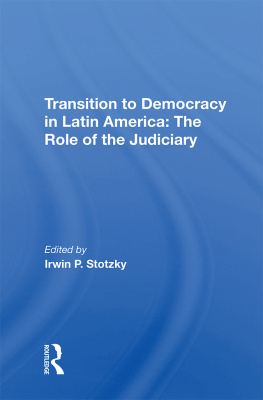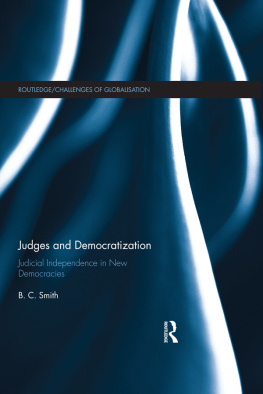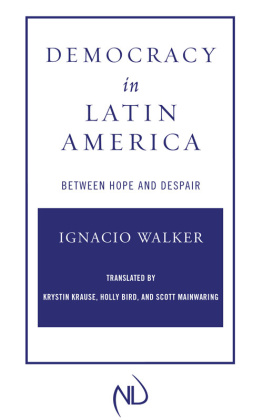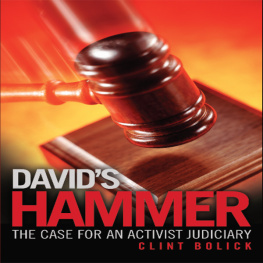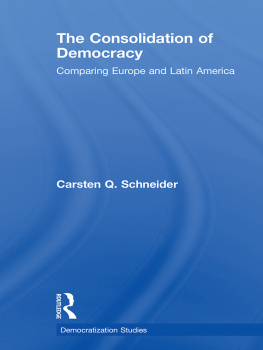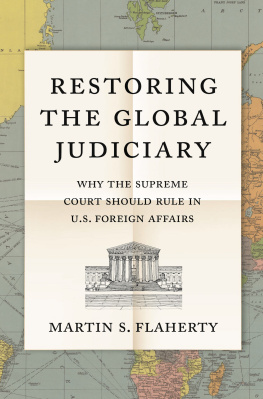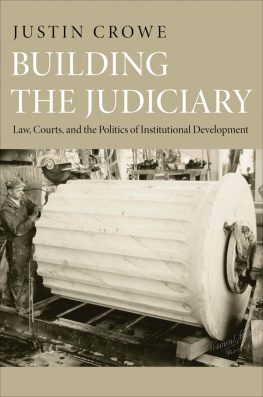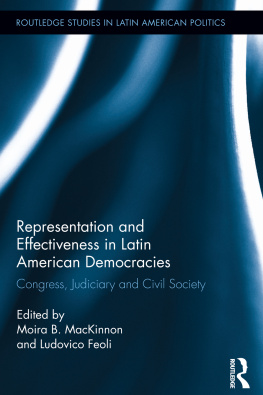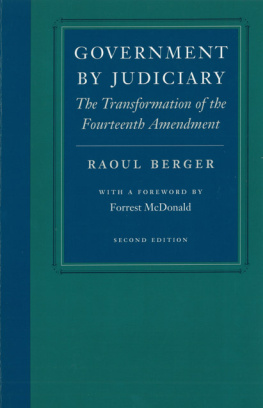First published 1993 by Westview Press, Inc.
Published 2018 by Routledge
52 Vanderbilt Avenue, New York, NY 10017
2 Park Square, Milton Park, Abingdon, Oxon OX14 4RN
Routledge is an imprint of the Taylor & Francis Group, an informa business
Copyright 1993 Taylor & Francis
All rights reserved. No part of this book may be reprinted or reproduced or utilised in any form or by any electronic, mechanical, or other means, now known or hereafter invented, including photocopying and recording, or in any information storage or retrieval system, without permission in writing from the publishers.
Notice:
Product or corporate names may be trademarks or registered trademarks, and are used only for identification and explanation without intent to infringe.
Library of Congress Cataloging-in Publication Data
Transition to democracy in Latin America: the role of the judiciary /
edited by Irwin P. Stotzky.
p. cm.
Includes bibliographical references.
ISBN 0-8133-8456-7
1. Judicial processLatin America. 2. Political questions and
judicial powerLatin America. 3. Human rightsLatin America.
I. Stotzky, Irwin P.
KG495.T7 1993
342.8'066dc20
[348.0266] 93-13943
CIP
ISBN 13: 978-0-367-21208-7 (hbk)
To Aaron (Dr. Dunk)
The idea for this book first occurred to me in 1990 after discussions with Carlos S. Nino and Owen M. Fiss. Subsequently, I spent part of 1991 and 1992 as a Fulbright Scholar in Argentina, where I worked at the Center for Institutional Studies (Centro de Estudios Institucionales). There, I had the opportunity to speak with many courageous and experienced people who have played and continue to play important roles in the transition process in several different Latin American nations. These meetings included discussions with academics, political activists, common citizens, and current and former government officials. I also gave lectures in several cities in Argentina and Chile and taught a course in constitutional theory at the center. The people I met during my trips across Argentina and Chile and the participants in the course convinced me of the importance of exploring the role of the judiciary in a transition process.
After intense analysis of the issues, Carlos Nino and I decided to facilitate discussion and scholarship among Latin and North Americans on the institutional importance of the judiciary in the transition to democracy and its consolidation. To achieve this goal, we met with a variety of very talented people with broad experience in this area. This created an intriguing dynamic. Indeed, the level of debate and interaction among these people was truly extraordinary. On the basis of these experiences, I decided to solicit articles for this book.
There are so many persons to whom I am indebted and grateful that it would be difficult to acknowledge adequately all those who have helped. Nevertheless, I shall attempt to acknowledge those persons who have been the most helpful.
I am especially grateful to Owen Fiss for first introducing me to the ideas involved in the transition to democracy in Latin America and for all of his encouragement and support over the years as a teacher and friend. I am also deeply grateful to Carlos Nino for all of his support, friendship, and interest in this project. His involvement was crucial for the success of the project. Jaime Malamud-Goti played an indispensable role in helping to make sense out of some of the ideas and essays and in his very helpful editing suggestions. His experience and friendship were invaluable. Nora Whitlock played an equally important role in the entire scheme of things. She helped organize the meetings and worked extremely hard and with great skill on editing the essays and finding footnotes for the articles. Melanie Trexler's first-rate help in finding footnotes, editing, cite checking, and proofreading proved invaluable. She never wavered, even in the face of impossible deadlines and unreasonable demands. She deserves special praise. Joanne Harvest Koren's work on Roberto Gargarella's article was outstanding. Vivien Toomey Montz did an equally good job on Carlos Nino's chapter. Martha Seijas did a wonderful job of helping to translate and edit the chapter of Ral R. Alfonsn. Sarah Clasby also did an excellent job on the editing of Alfonsn's chapter. Audrey R. Goldman's editing suggestions on my article and her support of this project were indispensable. David B. Feingold's support was also extremely important.
The University of Miami Library staff was always helpful. In particular, I am indebted to Ruth Parlin, whose research was indispensable. Edgardo Rotman also provided important research help. I am deeply grateful to all of the library's staff.
In addition, there were many students whose energy and talent eased ray research and proofreading burdens as the work progressed: Laurie Adams, Suzanne R. Amster, Lisa R. Askowitz, Mary Elizabeth Borja, Floyd Chapman, Cheryl Cooper, James G. Dodrill II, John B. Duer, Rosemary Ernst, Dianne O. Fischer, Anthony Lauriello, Wendy Miller, Gary Murphree, and Reed Slogoff.
I wish also to thank the secretaries who helped in typing various parts of the manuscript: Jennifer Alexander, Lidia Grumberg, Haydee Gonzalez-Pola, and Phyllis Taggett. Evelyn Medina did an excellent job of helping to put the book into camera-ready form. Barbara Wingard deserves special mention. She combined intelligence with competence and hard work and almost single-handedly typed several drafts of the book. Trenesia Green-Smith also deserves special praise for her competence, intelligence, and dedication to the project. She not only did an excellent job of putting the book into camera-ready form but also made helpful suggestions concerning format, style, and substance. Her work was truly first-rate.
I am also indebted to Barbara Ellington, senior editor, Westview Press. Her editorial suggestions and patience were crucial to the timely completion of the book.
Finally, I am grateful to the University of Miami Law School, the University of Miami North-South Center, and the Fulbright Commission for financial support for this project.
Irwin P. Stotzky

